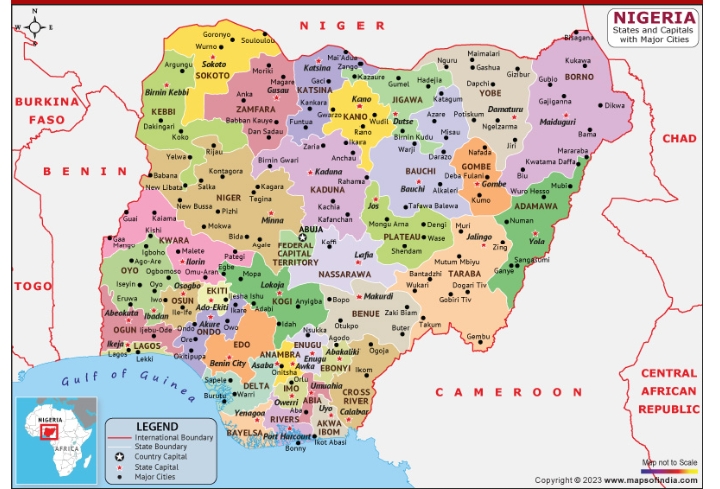By Ambrose Nnaji
The three tiers of government- the Federal, States and Local government shared the total sum of N10.143 trillion from the Federation Account as statutory revenue allocations in 2023.
This information and data are contained in the latest report by the Nigeria Extractive Industries Transparency Initiative (NEITI) on the Federation Account revenue allocations for the year 2023.
The Executive Secretary, Orji Ogbonnaya Orji, who announced the release of the report in Abuja, said that the agency embarked on the NEITI FAAC Quarterly Review to enhance public understanding of Federation Account allocations and disbursements as published by government.
“The ultimate objective of this disclosure is to strengthen knowledge, awareness and promote public accountability of all institutions in public finance management”, the executive secretary stated.

Orji Ogbonnaya Orji
A breakdown of the revenue receipts showed that the federal government received N3.99 trillion, representing 39.37per cent of the total allocation. The 36 states got N3.585 trillion representing 35.34per cent while the 774 local government councils of the Federation shared 2.56 trillion equivalents to 25.28per cent.
A further analysis of the N10.143 trillion disbursements in 2023 showed an increase of N1.934 trillion or 23.56per cent when compared to the disbursement of N8.209 trillion shared in the corresponding year 2022. The review attributed the increase to improved revenue remittances to the federation account due to the removal of petrol subsidy and the floating of the exchange rate by the new administration.
The report highlighted that while total revenues distributed from the federation account recorded an overall increase of 23.56per cent in 2023, the increase accruing to each tier of government varied, largely due to the type of the revenue streams contributing to the inflows into the federation account.
The NEITI Quarterly Review of 2023 FAAC allocations disclosed that the federal, states and local governments cumulatively received N1.934 trillion more than the amount shared in 2022. The first quarter of 2023 increased by N579.71billion (33.19%) when compared to the first quarter of 2022. The second quarter increased 10.32 per cent, third quarter by 27.49per cent while the fourth quarter had an increase of 23.42 per cent respectively.
The Federal Government’s share increased by N574.21 billion (16.79%) from the N3.42 trillion it received in 2022 to N3.99 trillion in 2023. The state governments shared N3.59 trillion in 2023 compared to the N2.76 trillion they got in 2022, showing an increase of 29.99 per cent. Similarly, local government councils’ share of federation allocation was N2.57 trillion in 2023 compared to N2.032 trillion in the 2023 which amounts to a 26.22 per cent increase.
While total distributed revenue from the Federation Account recorded an overall increase of 23.56 per cent in 2023, the increase accruing to each tier of government varied, largely due to the type of revenue item contributing to the inflows into the Federation Account. In the same period (2023), states and local governments recorded increases in their allocations of 29.99per cent and 26.22 per cent respectively. The increase in allocation to the Federal Government however was 16.79per cent.
State by state share of the allocations showed that Delta State received the largest share of N402.26 billion (gross). The figure is inclusive of the state’s share of oil and gas derivation revenue. Delta was followed by Rivers State which received N398.53 billion. Akwa-Ibom State received the third largest allocation of N293.58 billion. Nasarawa State received the least amount of N73.32 billion while Ebonyi and Ekiti states received N73.91 billion and N74.04 billion respectively.
The review observed that the first five states that topped the allocation during the period under review are amongst the major oil producing states in the country.
On the share of 13 per cent derivation revenue, nine states received the 13per cent allocated to mineral producing states from the proceeds from mineral revenue. The derivation revenue remains a significant portion of revenue for states like Delta, Akwa Ibom, Anambra and Rivers states. Also, the derivation revenues of states such as Delta, Akwa Ibom, and Bayelsa, which were 161.47per cent, 141.25per cent and 127.89per cent respectively, eclipsed their statutory revenues. Rivers State‘s derivation revenue was 74.15per cent during the period. Notably, the other five oil producing states recorded lesser derivation revenue compared to the four above. For example, Ondo State had 27.71per cent, Edo had 30.04per cent, while Abia, Anambra and Imo recorded a derivation revenue of about 20per cent or less.
The NEITI report noted that solid minerals producing states did not receive derivation revenues during the last quarter of last year because of the need to allow the revenues to accumulate over a period of time before sharing can occur.
On direct deductions from state, Delta State recorded by far the largest debt deductions in 2023. With total deduction of N12.97 billion, Delta debt deduction was more than the deductions for Bauchi state, the second largest, in 2023 by 282 million Lagos state recorded the least cumulative debt deductions amounting to N370million.
The report maintained that the reduced debt burden is attributable more to the increase in the size of Federation Account allocations than a reduction in the size of debt. The stark similarity in the debt size and sustainability charts indicates that states’ borrowing decisions are being determined by the size of their Federation Account allocations and expected future earnings. While this pattern indicates good fiscal decisions by the states, it may also cause states to increase their current borrowing as revenues from the Federation Account allocations are beginning to increase.
Other key findings of the report showed that revenue remittances to the Federation Account fluctuated significantly on monthly basis due to corresponding fluctuations in oil and gas revenue. Oil and gas revenues reflected crude oil prices and Nigeria’s output which in turn is significantly affected by crude oil theft and acts of sabotage.

 Crime1 year ago
Crime1 year ago
 Business5 years ago
Business5 years ago
 News6 years ago
News6 years ago
 Crime2 years ago
Crime2 years ago
 News2 years ago
News2 years ago
 News6 years ago
News6 years ago



















